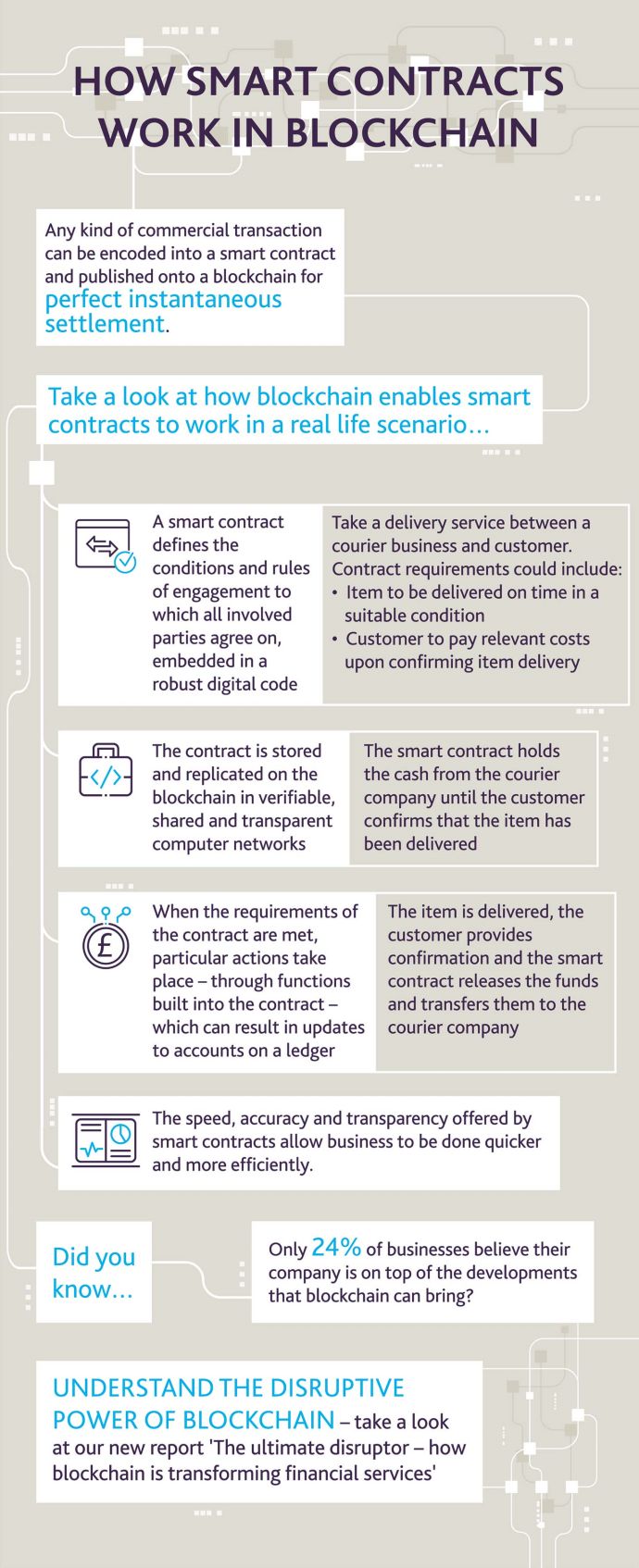- within Compliance and Tax topic(s)
- with Senior Company Executives, HR and Inhouse Counsel
- with readers working within the Healthcare and Law Firm industries
Smart contracts have the potential to change the way in which business is transacted by enabling it to be completed more quickly and efficiently through the use of blockchain technology. Businesses in banking and financial services in particular are recognising the potential of leveraging this technology to transform their operations and client interactions.
In our latest report ' The Ultimate Disruptor: How Blockchain is Transforming Financial Services', we highlighted the fact that only 24% of businesses believe their company is on top of the developments that blockchain can bring to their activities. This leaves an astonishing proportion of businesses that are not taking full advantage of what is available as this technology continues to develop.
What is blockchain?
When discussing smart contracts, I always find it best to start with an explanation of blockchain and how it works. Blockchain is a form of distributed ledger technology (DLT) that provides a transparent and decentralised way of recording lists of transactions. The digital information is then distributed rather than copied, which essentially means that there are no copies that can be altered or that differ from one another. If any information is changed then everyone in the network would be made aware immediately.
The benefit of blockchain is that it provides a verifiable and auditable history of all information stored on each dataset. Smart contracts using blockchain store every record in the distributed ledger with a cryptographic signature and time stamp.
How does blockchain enable smart contracts to work?
One of the questions most often asked of the use of smart contracts is "how could smart contracts using blockchain be applied in a real-life scenario?". A simple example is to look at a delivery service between a courier business and a customer.
In a courier business there could be several contract requirements such as delivery time or payment. The process of ensuring these contract requirements are fulfilled quickly and accurately could be assisted by implementing blockchain technology.
The smart contract would define the conditions and rules of engagement for all parties involved with the agreement and then embed these in a digital code, e.g. a customer pays the relevant costs when they confirm the item has been delivered.
Storing and replicating the contract using blockchain, and the associated verifiable, shared and transparent networks, ensures that the data is accurate and trustworthy. In this example, the smart contract would hold the payment from the courier company until the customer has confirmed delivery.
When the customer confirms the delivery, the smart contract would then release the money and transfer it to the courier company. By the requirements of the contract being met, particular actions are allowed to take place which result in updates to accounts on the ledger.

Benefits of smart contracts for financial services
I have used the example of a courier company to simplify how smart contracts can benefit organisations across industries. In the world of financial services there are a multitude of different projects being implemented that illustrate the level of investment being made into blockchain development.
As discussed in our report ' The Ultimate Disruptor: How Blockchain is Transforming Financial Services', the R3 Consortium has been developing a software solution with distributed ledger technology in association with more than 100 banks, financial institutions, regulators, trade associations and technology companies. The aim of the consortium is to make banking simpler and cheaper by replacing financial technology platforms that communicate poorly with one another so that costs are minimised and efficiencies improved.
The R3 Consortium is just one example of smart contracts and blockchain technology being implemented in banking and financial services to change the way in which we transact business.
During the research undertaken for our report, the Technical Lead for DLT and cryptocurrency technology at HSBC, Barry Childe, commented; "Distributed ledger technology is mostly not about what one firm does, its strength is as a collective or collaborative. It's important we get it right as it's transformative for the financial services industry. It's about people being able to transact and do business easily and safely."
We believe that there are two primary opportunities that are offered by smart contracts using blockchain to banking and financial services organisations. The first is that they are able to streamline back office processes, making business transactions faster, more efficient and less costly. The second opportunity is that they offer the ability to enhance trust and interoperability. Business contracts are automatically executed and enforced, with their outcomes being validated by everyone in that network.
Understanding the impact of smart contracts for financial services
The potential of smart contracts using blockchain in financial services is an interesting one. Our report ' The Ultimate Disruptor: How Blockchain is Transforming Financial Services' discusses research from several sources. Please do take a look at the report to find out more about the current level of investment, the different projects being undertaken and the full extent of how this technology can transform the industry.
Read the original article on GowlingWLG.com
The content of this article is intended to provide a general guide to the subject matter. Specialist advice should be sought about your specific circumstances.
[View Source]
